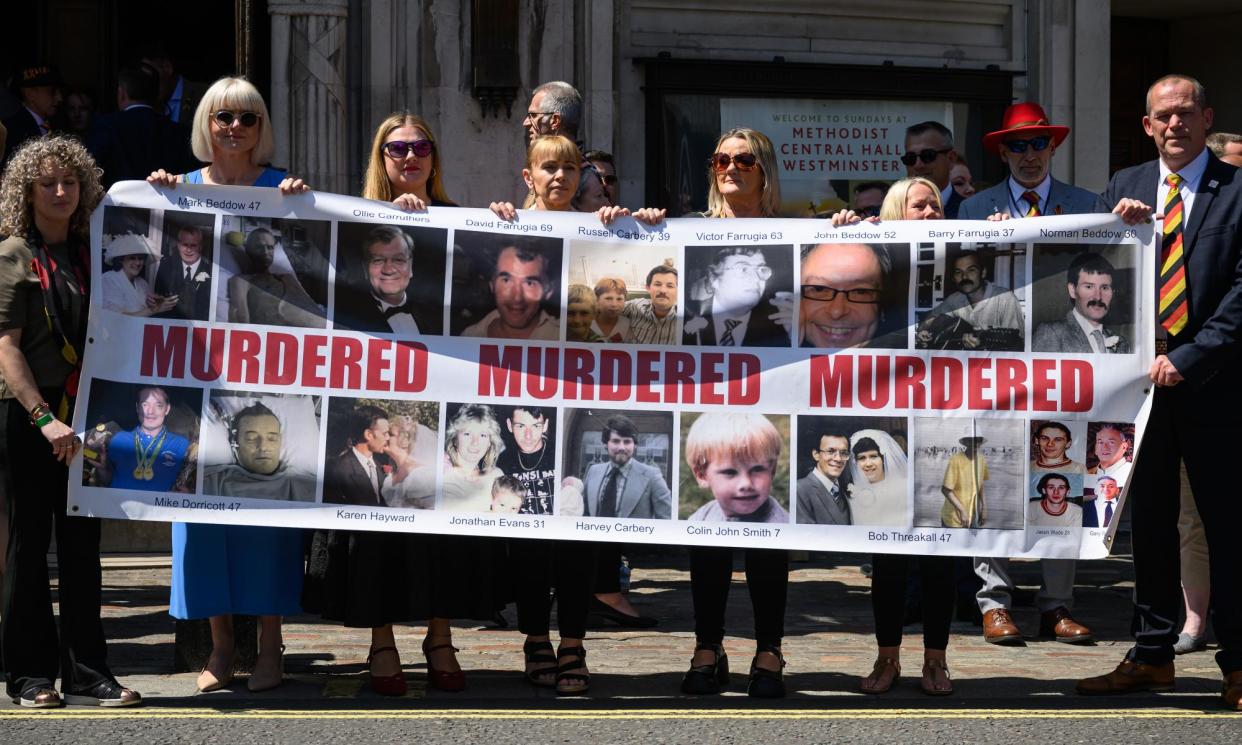Hundreds of victims in infected blood scandal to sue UK health secretary

Hundreds of people in the UK infected with contaminated blood and relatives of those infected are going ahead with plans to sue the health secretary for damages, having been left dissatisfied with the government’s announcement on compensation.
A group claim by about 500 people against the government alleging it breached a duty to take reasonable care to prevent personal injury or loss, amounting to misfeasance in public office, began in 2017 but was paused pending the inquiry into the scandal, which published its final report on Monday.
Explaining the reason for looking to reinstate the lawsuit despite the government’s announcement of a compensation framework, Des Collins, of Collins Solicitors, said: “The reason we’ve done that is we started the week off on a high with the [Sir Brian] Langstaff report saying pretty much everything we’ve said for seven years.
“Then we went on to Rishi [Sunak] and his abject apology in the House [of Commons] on Monday afternoon, the announcement of a compensation framework on Tuesday, but it wasn’t until we got the first draft of paperwork on that compensation recovery programme that we realised that there are holes and gaps in it.”
He said the headline figures for the government scheme, which suggested that some people could get more than £2.5m in compensation, were not all that they seemed and that his clients felt “bounced into settlement”.
The death toll, which already stands at 3,000, is rising weekly among the 30,000 or so people who were infected with hepatitis C, HIV or both from the 1970s to the early 90s, either from receiving transfusions during surgery or through blood plasma products imported from the US to treat haemophiliacs.
One of the issues concerning people about the compensation framework is the end of support schemes under which people have received monthly payments but will be superseded by the announced plans.
Collins said the government should have sat down with those affected before announcing its compensation scheme.
Separately, survivors and relatives of people who died in the infected blood scandal are suing a school where they contracted hepatitis and HIV after being given experimental treatment without informed consent.
Langstaff’s report found that children at Treloar college – a specialist school in Hampshire for haemophiliacs – had been used as “objects of research” while the risks of infection were ignored. He said that only 30 pupils remain of the 122 who attended the school, calling it “unconscionable”.
Richard Warwick, 58, who was infected with HIV and hepatitis C at Treloar’s and is part of the group action, said: “We’ve no intention of bankrupting the school or anything like that, it’s just a matter of getting some sort of recognition from them.
“They just seem to be sat on their hands, denying any responsibility for what we know factually went on at the school. If you read the second half of volume two [of the inquiry report], Sir Brian is so critical of what happened there, what went on there and the way the children were treated. Things that went on there shouldn’t have happened.”
The action against Treloar’s was lodged in 2022 but, like the claim against the health secretary, was paused pending conclusion of the inquiry.
The former pupils are also calling for the college’s headteacher at the time, Alexander MacPherson, to return his OBE. “There’s nothing that he did down there that was honourable as far as we’re concerned, certainly with regards to the haemophiliacs,” said Warwick. “I think that would be the right thing for him to do.”
The Guardian attempted to reach Treloar’s for comment. In a statement released on Thursday, the school said: “We sincerely apologise to our former students and their families who were so devastatingly infected and affected by the infected blood scandal.
“We apologise too for the criticisms contained in the report. The treatment by clinicians of pupils at Treloar’s in the 1970s and 1980s was unethical and wrong.
“The way in which the diagnosis of infection was communicated was insensitive and wrong. In other cases, failure to communicate positive tests for HIV at all was unconscionable and wrong.”
The government said it did not comment on legal cases while they were in progress.

 Yahoo News
Yahoo News 